|
Join Our List
|

|
|
|

|
LETTER FROM THE EDITOR
| |
In this Summer-Fall double issue of AEMS News and Reviews, we offer five reviews of six films featuring subjects from across Asia. We have a review of two films about Tibet, an area of Asia that is seeing continued strong interest, and other reviews covering topics such as the circumstances of a particular group of outcaste class performers in India, a Japanese family divided by WWII, environmental problems in China and a film about the changing fortunes of an American in China in the early years of the People's Republic, and a film on the very competitive hobby of dove raising in Indonesia. I would also like to bring your attention the open call for the Film Expo at the Association for Asian Studies Conference. Film Expo information is included in this issue; submission deadline is November 30, 2013. I wish as always to extend my thanks to the reviewers for providing reviews of these films, and as always, we welcome suggestions for films we might review and reviewers who would be willing to contribute.
William Londo
|
|
FILM REVIEW
| | |
The Revolutionary
Directed by Irv Drasnin, Lucy Ostrander and Don Sellers.
2012. 92 minutes. In English.
Reviewed by Matthew D. Johnson.
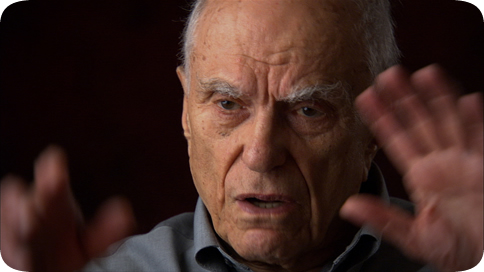
Very few Americans ever gained first-hand experience of Chinese politics during the Mao years. Even those few political travelers and ambitious reporters who arrived in Beijing were insulated from the realities of mass campaigns and witch-hunts for internal enemies. These realities were deliberately concealed from foreign visitors the Chinese Communist Party. Instead, the few accounts that did return from the People's Republic of China mostly glowed with accounts of well-run state institutions, improving economic conditions, and the revolutionary wisdom of the Communists. For the small international community of foreign experts living in China during the Mao years, exposure to the tumult of political upheaval in the name of the revolution could be somewhat more direct. This was certainly the case for Sidney Rittenberg, a South Carolina-born union organizer who became a Communist Party member and direct participant in the Cultural Revolution. The Cultural Revolution was Communist Party leader Mao Zedong's experiment in revolution without a revolutionary party to lead it. It was, in Rittenberg's account, essentially an object lesson in controlled anarchy whose ultimate outcome for the people of China was death, torture, and spiritual trauma. READ MORE...
|
| FILM REVIEW | |
ManDove Directed by Jim De Sève and Kian Tjong. 2012. 65 minutes.
Indonesian and English with English subtitles.
Reviewed by Constance Rogers.
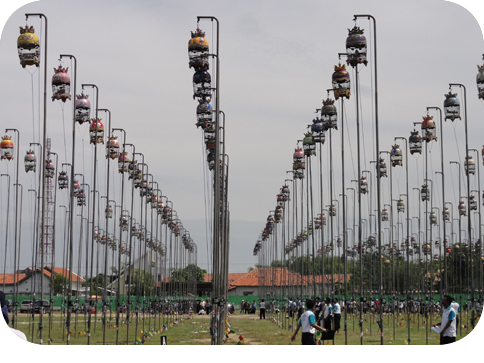
Only male perkutut, or zebra doves, sing. And in the very male world of Muslim Indonesia only men raise these sweetly singing birds, that are worth more than their weight in gold. ManDove (sub-titled Real Men Need Doves) introduces the west to the popular Southeast Asian practice of breeding and raising valuable song birds, often Zebra doves, for lucrative competition. Focusing on four Indonesian perkutut farm owners and competitors De Sève and Tjong walk us gently into a world of the men who devote their days and resources to every aspect of their song birds' care.
We are taught by one of the men, Prince Prabukusumo, that in Javanese philosophy a man achieves perfection in life by possessing five things: a wife, a house, a dagger, a horse and a bird, preferably a perkutut or zebra dove. The men in ManDove, who share their homes and time with us, have achieved this perfect life. They, and the filmmakers, show us a peaceful, tolerant, middle-class, and a humorous side of Indonesia and Islam that are seldom shown in American media.
READ MORE...
|
| FILM REVIEW | |
Embrace (Huaibao)
Directed by Dan Smyer Yu and Pedma Tashi. 2011. 55 minutes.
Tibetan, with English subtitles.
Old Dog (Khyi rgan/Lao gou)
Directed by Pema Tseden. 2011. 88 minutes. In Tibetan, with English and Chinese subtitles.
Reviews by Howard Y. F. Choy.
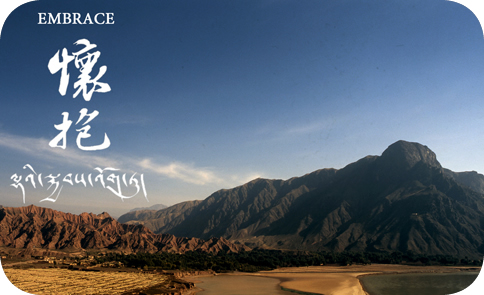
For the first time in Chinese film history, facilitated by digital video technology, Tibet talks back to its metropolitan state in its own voice. Made to represent the Tibetans themselves in their mother tongue, emerging Tibetan cinema, be it documentary or drama, expresses resistance to the pressures of materialistic modernization and market economy imposed by China.
Embrace, directed by Dan Smyer Yu and Pedma Tashi, is a documentary about Tibetan sacred mountains and rivers told by two tantric yogis, father Babu Tashi and son Pedma Norbu, from a remote village in the Amdo area on the Qinghai-Tibet Plateau. Narrated through the religious exposition of a plethora of mountain and water spirits, with detailed descriptions of their arms and appearances, the film is infused with majestic mountain scenery and mystic ritual scenes which, however, are disrupted by messy mining shots in the end. [...]
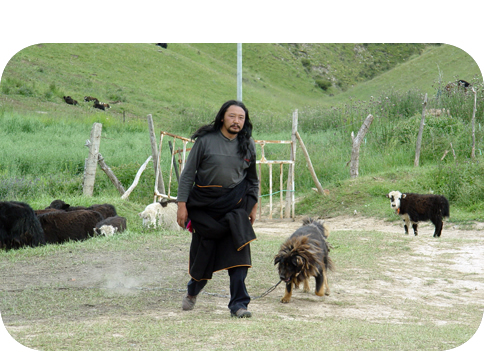
If Embrace employs mythology as its method to critique modernization, Old Dog takes demystification as its means to resist commodification. The third feature - after The Silent Holy Stones (2005) and The Search (2009) - of Pema Tseden, the first Tibetan-language filmmaker in China, Old Dog has won several prizes, including the 2011 Golden DV Award at the Hong Kong International Film Festival. A slow, documentary-like, music-free (save songs recorded on the street)movie using sync sound, it tells a simple story from the everyday life of a localsemi-settled herding family. The film's title refers to the Tibetan mastiff, a species that has become the world's most expensive dog worth as much as1.6 million dollars, and hence a hot item on the black market.
READ MORE...
|
| FILM REVIEW | |
This Is A Music! Reclaiming An Untouchable Dream
Directed and narrated by Zoe Sherinian. 2011. 74 minutes.
Optional Indian-English English subtitles.
Reviewed by Susan S. Wadley.
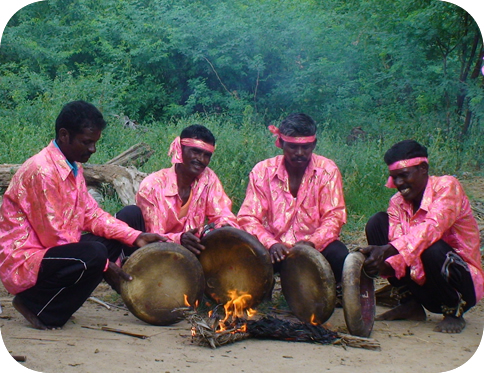
Throughout much of India, lower caste, often untouchable musicians, provide the music for a variety of religious events, including festivals in honor of the goddess Mariamman and the god Murugan, and sometimes the Virgin Mary. One such group in Tamil Nadu is the Paraiyar frame drummers who were also known for playing music for funerals. Although according to local legend, the Paraiyar originally worked for kings and their drums were used to make announcements for the king and for leading his armies into battle, today they are considered untouchable due both to their playing at funerals and to the leather used in the drum itself. Both the leather drum and the funeral are considered polluting, contributing to their untouchable status. Together with their dismal economic status, the Paraiyar have had no choice but to continue to drum as required by the hereditary social relations found in many Indian villages. Socially outcast, literally not touchable by those of higher caste, they live in separate hamlets and were banned from wearing shirts, putting an honorific towel over their shoulder, or even donning sandals, as noted by a Christian minister who was from an untouchable group. Speaking of his mother's request that he take off his shoes while in his home village in order to avoid high caste retribution due to breaking the rules, he stated, "We feel humiliated."
READ MORE...
|
| FILM REVIEW | |
Honor and Sacrifice: The Roy Matsumoto Story
Produced by Stourwater Films . 2013. 28 minutes.
In English.
Reviewed by Louis G. Perez.

The idea of risking your life to prove your loyalty to a country that has imprisoned your friends and relatives only because they resembled enemies seems to be a far-fetched one, until one compares American history in 1942 to what has happened since September 11, 2001. In 1942, American citizens of Japanese ancestry were rounded up like cattle and whisked off to "relocation camps" for "their own protection," mainly because they looked like the people who had bombed the American naval base at Pearl Harbor in Hawai'i.
Young boys born to Japanese-American parents (many of whom were themselves born in the United States) flocked to join the American military in part to prove their allegiance to a nation that had imprisoned them simply because of racial profiling. Thousands of these young men served bravely while their relatives languished in concentration camps in the middle of the American desert. Thousands of them were wounded or killed serving in such military units as the 442nd Regimental Combat Team, the single most highly-decorated American military unit during World War II. Many of these young war veterans returned to the United States as war heroes after having been wounded in combat, visited those concentration camps, separated from their parents by strands of barbed wire.
READ MORE...
|
CALL FOR FILMS - AAS Film Expo 2014
| |  The Association for Asian Studies (AAS) annually hosts the premier North American conference of Asia scholars devoted to scheduled programs of scholarly papers, roundtable discussions, workshops, and panel sessions on a wide range of issues in research and teaching, and on Asian affairs in general. The upcoming AAS conference is scheduled for March 27-30, 2014 at the Philadelphia Marriott Downtown in Philadelphia, PA. AAS Film Expo was established as a conference program in 2011 by the Asian Educational Media Service (AEMS), to present documentary and independent films on issues reflecting contemporary life in Asia in a dedicated screening room with a schedule running from Thursday through Saturday. We welcome the submission of films related to Asia produced by scholars and independent filmmakers. Criteria utilized in the selection process include timeliness, broad appeal to the scholarly community, and examples of new field work. All films presented in the conference are promoted in a special AAS Film Expo booklet which includes contact information for distributors or filmmakers who self-distribute.
For more information, please download the AAS Film Expo Submission Form here.
*** DEADLINE FOR SUBMISSIONS IS NOVEMBER 30, 2013 ***
|
| AsiaLENS FILM SERIES | |
AsiaLENS is a series of free public film screenings and lecture / discussion programs -- organized by AEMS in collaboration with the Spurlock Museum -- presenting recent documentary and independent films on issues reflecting contemporary life in Asia. Local and visiting experts introduce the films and lead audiences in post-screening discussions.
All AsiaLENS screenings are FREE and open to the public.
Our upcoming screenings are:
A Perfect Soldier
Tuesday, November 12, 2013 - 7:00 pm
Spurlock Museum, 600 S. Gregory Street, Urbana, IL
CLICK HERE FOR MORE INFO
|
| WEBSITE: DIGITAL ASIA | |  Digitial Asia, a website bringing documentary films on contemporary East Asia to the classroom, has been launched by the Asian Educational Media Service (AEMS). In providing free access to excerpts of scholar made films on Asia, along with downloadable curriculum materials, Digital Asia offers high school and college educators an easy way to incorporate today's issues in Asia as part of their lesson plans. Digital Asia can be found at: www.digitalasia.illinois.edu Digital Asia is funded by the Freeman Foundation of Stowe, VT., New York City and Honolulu and by the IL/IN East Asia National Resource Center funded by U.S. Department of Education Title VI. |
|
| SUPPORT AEMS | | AEMS invites our supporters to make targeted donations to enhance our holdings and public programs. A donation of $30 can be used to purchase a film for the AEMS library. $300 will sponsor an AsiaLENS screening on campus or in the Champaign-Urbana community. $500 will help underwrite a film and curriculum materials in Digital Asia. Donations for specific materials or events will be acknowledged both in News and Reviews and at sponsored events. Thank you for your ongoing support of AEMS.
Follow this link to make an online donation.
PLEASE NOTE:
You will be directed to the CEAPS Giving page.
After clicking "Continue With Your Donation" you will find a Special Instructions section where you can highlight "yes" under the question "Do you have other instructions for processing your gift?"
A text box will open where you can direct your gift to the following:
AEMS - Asian Educational Media Service Fund -or- Digital Asia Fund
|
NEWS AND REVIEWS
| | Previous issues of News and Reviews:
Electronic newsletters - September 2010 - Summer/Fall 2013
Archived print newsletters - Spring 1998 - Fall 2009
|
| ABOUT AEMS | | Media Production Group
In addition to hosting film screenings, AEMS also produces and distributes its own materials under the brand name Media Production Group (MPG) . These are short educational videos and DVDs about an aspect of Asian culture suitable for classroom use and accompanied by curriculum.
Database
AEMS maintains a searchable database of over 6,000 films about Asia, including length, format, distributor and synopsis.
Library
AEMS library, through its connection to the Lincoln Trails library system, circulates videos and DVDs locally from its collection of more than 2,000. |
Asian Educational Media Service
805 W Pennsylvania Ave | Urbana | IL | 61801
|
|
|